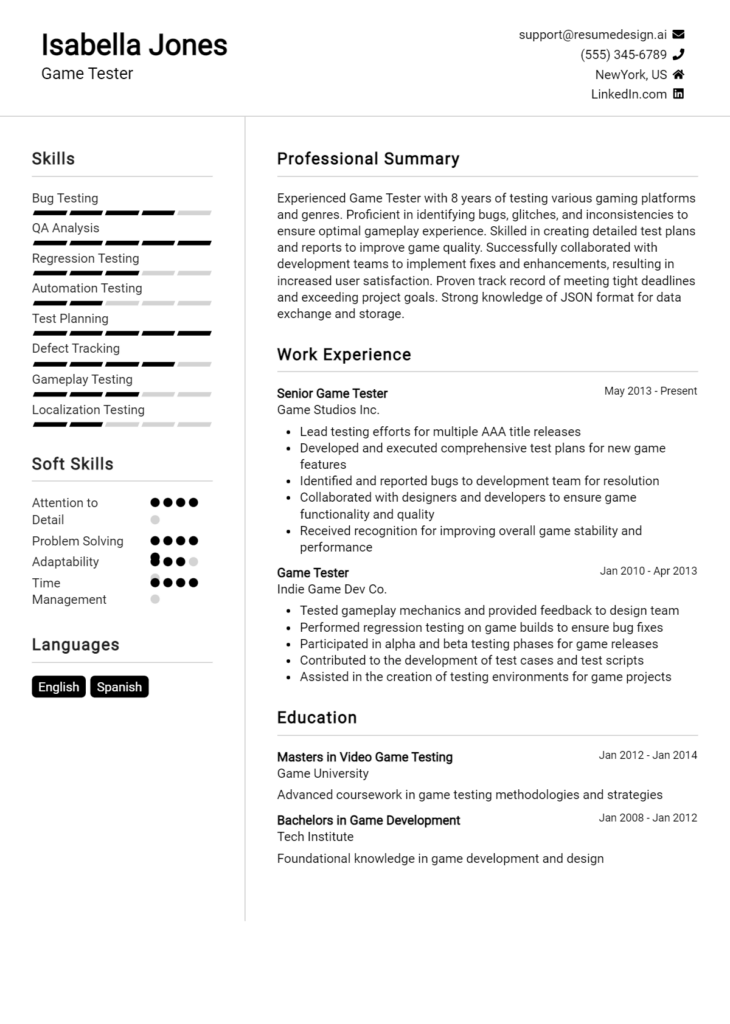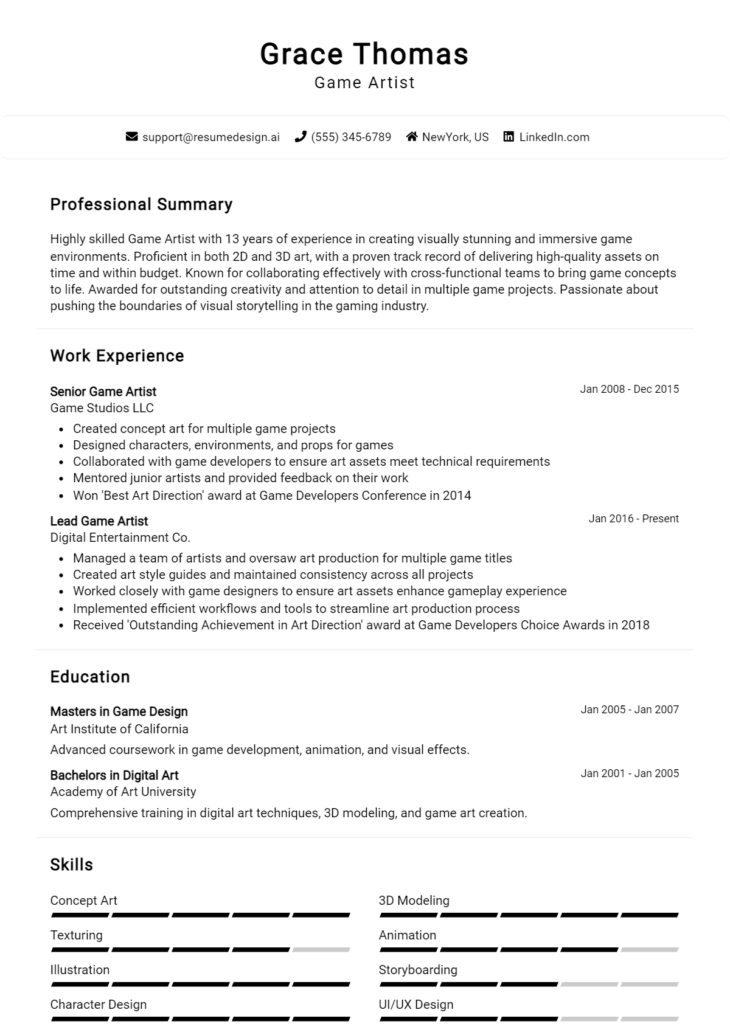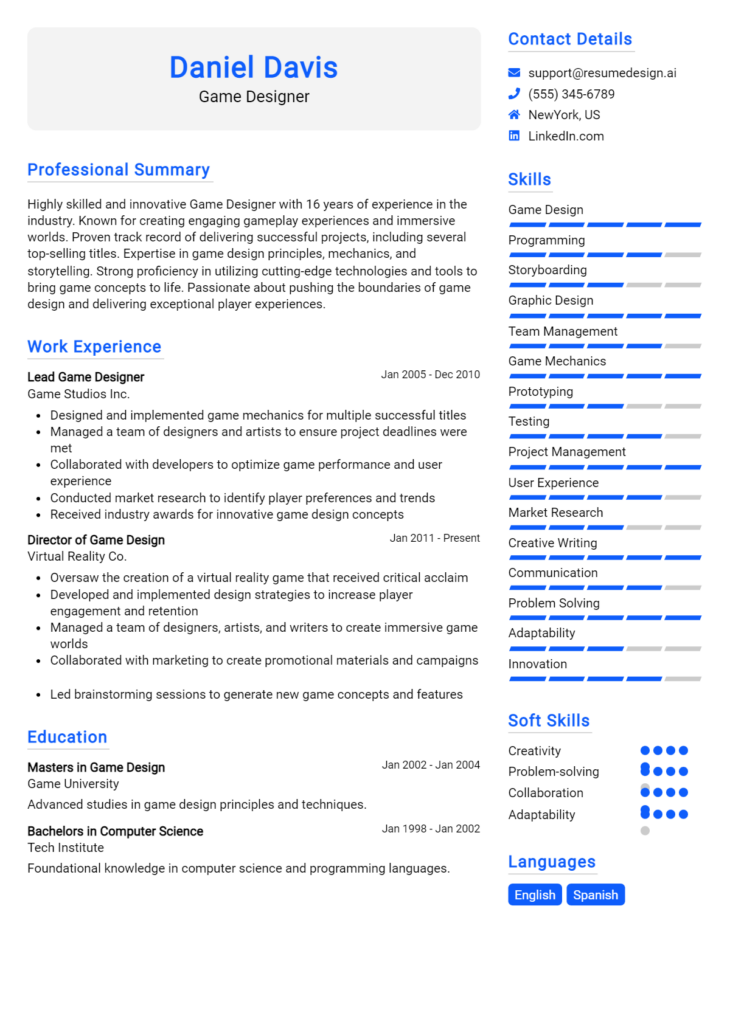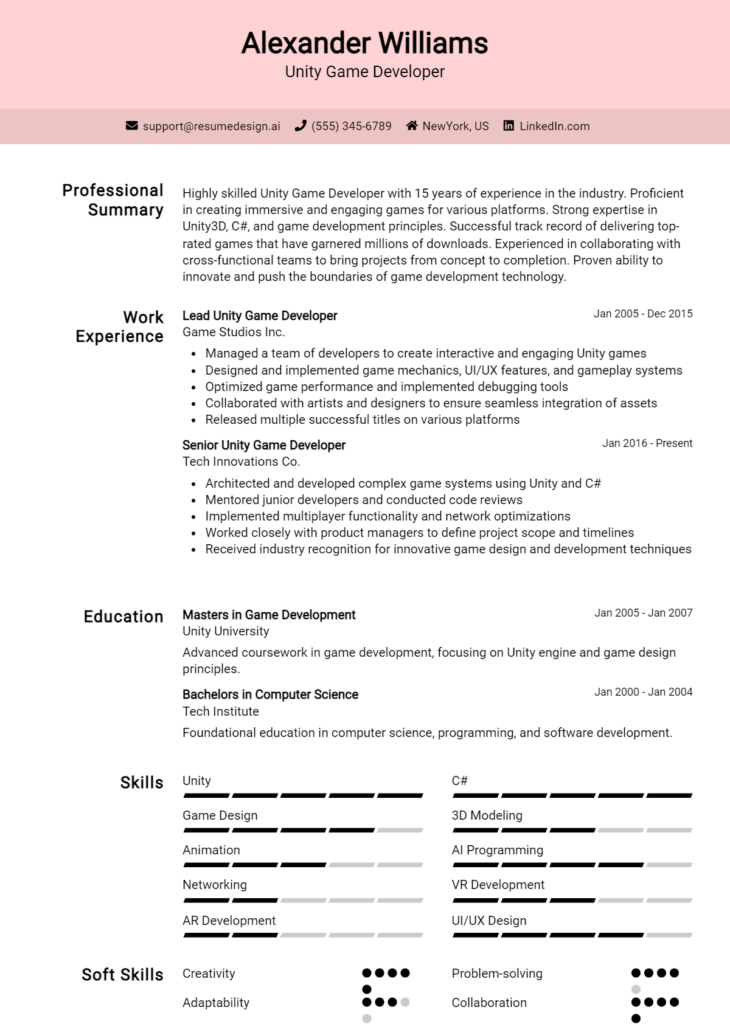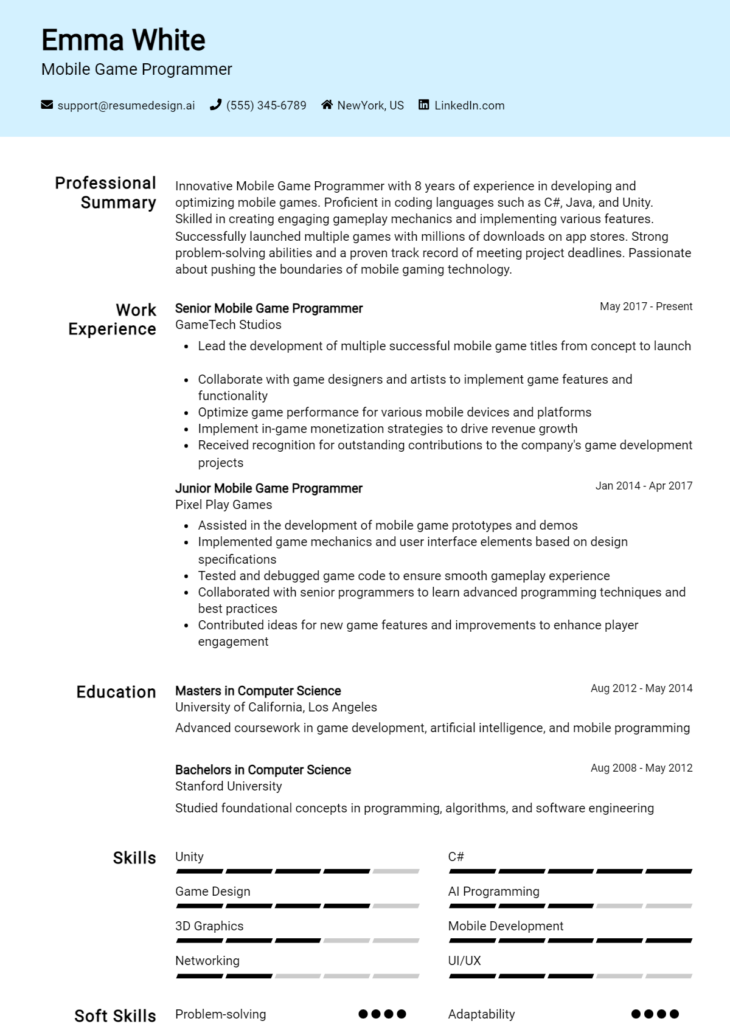VR Game Developer Core Responsibilities
A VR Game Developer is responsible for creating immersive virtual reality experiences by collaborating with artists, designers, and engineers. Key responsibilities include designing gameplay mechanics, coding interactive elements, and optimizing performance across platforms. Technical skills in programming languages and VR software are essential, alongside strong problem-solving and operational abilities. This role bridges multiple departments, ensuring cohesive game development that aligns with organizational goals. A well-structured resume highlighting these qualifications is crucial for showcasing expertise and securing opportunities.
Common Responsibilities Listed on VR Game Developer Resume
- Design and implement engaging gameplay mechanics for VR environments.
- Collaborate with artists to create visually stunning assets.
- Write and optimize code for performance and efficiency.
- Conduct playtesting and gather user feedback for improvements.
- Integrate audio and visual elements to enhance user experience.
- Develop VR applications for various platforms and devices.
- Stay updated with the latest VR technologies and trends.
- Debug and troubleshoot technical issues during development.
- Document development processes and game design specifications.
- Participate in team meetings to align project goals and timelines.
- Ensure adherence to VR best practices and industry standards.
High-Level Resume Tips for VR Game Developer Professionals
A well-crafted resume is crucial for VR Game Developer professionals as it serves as the first impression a candidate makes on a potential employer. In a competitive industry where creativity and technical prowess are paramount, your resume must effectively showcase not just your skills but also your achievements. It should reflect your unique capabilities in developing immersive virtual experiences, demonstrating your alignment with the demands of the role. This guide will provide practical and actionable resume tips specifically tailored for VR Game Developer professionals, helping you to stand out in a crowded job market.
Top Resume Tips for VR Game Developer Professionals
- Tailor your resume for each job application by closely aligning your skills and experiences with the job description.
- Highlight relevant experience in VR development, including specific projects, technologies used, and your role in the development process.
- Quantify your achievements by including metrics such as user engagement rates, project completion times, or sales figures related to your developed games.
- Showcase industry-specific skills such as proficiency in game engines like Unity or Unreal Engine, programming languages relevant to VR, and familiarity with VR hardware.
- Include a portfolio section with links to your previous projects, demos, or GitHub repositories to demonstrate your practical experience.
- Use action verbs and concise language to convey your contributions and results effectively.
- Highlight collaboration and teamwork experiences, as VR development often requires working cohesively with designers, artists, and other developers.
- Incorporate keywords from the job description to pass through Applicant Tracking Systems (ATS) and catch the hiring manager's attention.
- Keep the layout clean and professional, ensuring that your resume is easy to read and visually appealing.
By implementing these tips, you can significantly increase your chances of landing a job in the VR Game Developer field. A tailored and compelling resume not only highlights your qualifications but also demonstrates your commitment to excelling in this innovative industry, making you a more attractive candidate to potential employers.
Why Resume Headlines & Titles are Important for VR Game Developer
In the competitive field of Virtual Reality (VR) game development, a well-crafted resume headline or title serves as a critical touchpoint for candidates. It functions as a first impression that can immediately grab the attention of hiring managers, summarizing a candidate's key qualifications in a succinct and impactful phrase. A strong headline not only reflects the specific role being applied for but also encapsulates the applicant's unique value proposition. By being concise, relevant, and directly related to the job, a powerful resume headline can effectively set the tone for the entire application, increasing the likelihood of landing an interview.
Best Practices for Crafting Resume Headlines for VR Game Developer
- Keep it concise: Aim for a headline that is no longer than a single sentence.
- Be role-specific: Include the job title and relevant keywords that align with the position.
- Highlight key strengths: Emphasize your most notable skills or accomplishments.
- Use action-oriented language: Start with strong verbs to convey your expertise.
- Avoid jargon: Use clear language that can be easily understood by hiring managers.
- Tailor for each application: Customize your headline for different job applications to reflect the specific requirements of each role.
- Incorporate metrics: If possible, include quantifiable achievements to showcase your impact.
- Make it engaging: Create a sense of curiosity to encourage hiring managers to read further.
Example Resume Headlines for VR Game Developer
Strong Resume Headlines
Innovative VR Game Developer with 5+ Years in Creating Immersive Experiences
Award-Winning VR Designer Specializing in Interactive Storytelling and Gameplay Mechanics
Passionate VR Game Developer Proficient in Unity and Unreal Engine with a Focus on User Engagement
Weak Resume Headlines
Game Developer
Experienced Programmer Looking for Work
The strong headlines are effective because they encapsulate the candidate's skills, experience, and accomplishments in a way that is specific and engaging, immediately drawing the attention of hiring managers. In contrast, the weak headlines fail to impress due to their vagueness and lack of detail, making it difficult for recruiters to discern the candidate's qualifications or areas of expertise. By avoiding generic terms and instead focusing on impactful skills and experiences, candidates can significantly enhance their chances of being noticed in a crowded job market.
Writing an Exceptional VR Game Developer Resume Summary
A resume summary is a critical component for a VR Game Developer, serving as the first impression a hiring manager will have of a candidate's qualifications. A well-crafted summary quickly captures attention by succinctly showcasing key skills, relevant experience, and notable accomplishments that align with the demands of the role. In the fast-paced tech industry, where competition is fierce, a concise and impactful summary tailored to the specific job can set a candidate apart from the crowd, making it essential for landing an interview.
Best Practices for Writing a VR Game Developer Resume Summary
- Quantify your achievements to demonstrate impact (e.g., "Increased user engagement by 30% through innovative gameplay design").
- Focus on key skills relevant to VR development such as Unity, C#, 3D modeling, and user experience design.
- Tailor the summary for the specific job description to highlight the most pertinent aspects of your experience.
- Keep it concise—ideally 2-4 sentences that encapsulate your strengths and career highlights.
- Use action verbs to convey a sense of proactivity and results-oriented mindset.
- Include relevant certifications or training in VR development or game design.
- Avoid jargon unless it is standard within the industry, ensuring clarity for all potential readers.
- Showcase your passion for VR technology and gaming, as enthusiasm can resonate with employers.
Example VR Game Developer Resume Summaries
Strong Resume Summaries
Creative VR Game Developer with over 5 years of experience in designing immersive gaming experiences using Unity and Unreal Engine. Successfully led a team that increased player retention by 40% through innovative level designs and engaging storylines.
Detail-oriented VR Developer skilled in C# and 3D modeling, with a proven track record of delivering high-quality games on time. Developed a VR simulation that was downloaded by over 100,000 users within the first month of release, earning a 4.8-star rating on major platforms.
Passionate about virtual reality and game mechanics, I have designed and developed 10+ VR titles that have garnered critical acclaim. My recent project, a multiplayer VR adventure, achieved a 25% increase in active users within three months post-launch.
Weak Resume Summaries
Experienced game developer with knowledge of VR technologies. Looking for a challenging position in a reputable company.
I have worked on various game projects and have a general understanding of VR development. I am eager to contribute to your team.
The strong resume summaries are considered effective because they are specific, quantifiable, and clearly relate to the job role. They provide concrete examples of achievements and skills, showcasing the candidate's ability to deliver results in the VR gaming space. In contrast, the weak summaries lack detail and impact, offering vague statements that fail to convey the candidate's unique qualifications or enthusiasm for the position.
Work Experience Section for VR Game Developer Resume
The work experience section of a VR Game Developer resume is critical, as it provides potential employers with a window into the candidate's professional journey and capabilities. This section not only demonstrates the candidate's technical skills in game development, programming languages, and VR technologies, but also highlights their ability to manage teams and deliver high-quality products under tight deadlines. By quantifying achievements and aligning relevant experiences with industry standards, candidates can effectively communicate their value and expertise in the fast-evolving world of virtual reality gaming.
Best Practices for VR Game Developer Work Experience
- Highlight specific technical skills relevant to VR game development, such as proficiency in Unity, Unreal Engine, or C#.
- Quantify achievements with metrics, such as the percentage increase in user engagement or sales after a game's release.
- Use action verbs to convey leadership and collaboration, showcasing experiences where you led a team or worked cross-functionally.
- Tailor your experiences to align with the job description, emphasizing the most relevant projects and roles.
- Include any awards or recognitions received for projects to bolster credibility and demonstrate excellence.
- Detail the challenges faced during development and how they were overcome to showcase problem-solving abilities.
- Showcase any community involvement or contributions to open-source VR projects that reflect passion and commitment to the industry.
- Keep descriptions concise but informative, ensuring clarity and impact in each bullet point.
Example Work Experiences for VR Game Developer
Strong Experiences
- Led a team of 10 developers to create a VR game that achieved over 1 million downloads in the first month, increasing company revenue by 30%.
- Implemented advanced AI algorithms in a VR environment that improved player interaction metrics by 45% based on user feedback.
- Collaborated with the design team to develop immersive UI/UX features, resulting in a 50% reduction in user drop-off rates during gameplay.
- Managed the full development cycle of a VR project, from concept to launch, delivering the product 2 weeks ahead of schedule.
Weak Experiences
- Worked on various VR projects.
- Assisted in game development tasks.
- Participated in team meetings and discussions.
- Helped with some programming duties.
The examples of strong experiences are considered effective because they provide specific accomplishments, metrics, and clear descriptions of the candidate's roles and contributions, illustrating their impact on projects. In contrast, the weak experiences lack specificity and do not highlight any quantifiable results or significant responsibilities, making them less impressive to potential employers.
Education and Certifications Section for VR Game Developer Resume
The education and certifications section of a VR Game Developer resume is vital for showcasing the candidate's academic background and commitment to professional growth in a rapidly evolving field. This section serves as a platform to highlight relevant degrees, industry-recognized certifications, and continuous learning initiatives that align with the demands of virtual reality game development. By providing specific coursework and specialized training, candidates can significantly enhance their credibility and demonstrate their preparedness for the complex challenges associated with VR game design and development.
Best Practices for VR Game Developer Education and Certifications
- List degrees and certifications that are directly relevant to game development, such as Computer Science, Game Design, or Virtual Reality.
- Include any specialized training or workshops that focus on VR technologies or game engines like Unity or Unreal Engine.
- Highlight coursework that pertains to game development, programming, 3D modeling, or user experience design.
- Prioritize industry-recognized certifications from reputable organizations, such as the International Game Developers Association (IGDA) or Unity Certified Developer.
- Keep the section concise; focus on qualifications that enhance your candidacy for the specific role you are applying for.
- Consider including ongoing education, such as online courses related to emerging technologies in VR.
- Clearly indicate the dates of completion for degrees and certifications to demonstrate your up-to-date knowledge.
- Use bullet points for clarity, making it easy for hiring managers to quickly assess your qualifications.
Example Education and Certifications for VR Game Developer
Strong Examples
- Bachelor of Science in Computer Science, University of California, 2021
- Unity Certified Developer, 2022
- Coursework in Game Design and Development, including Advanced 3D Modeling, Interactive Media, and User Experience Design
- Certificate in Virtual Reality Development from Coursera, 2023
Weak Examples
- Associate Degree in General Studies, Community College, 2018
- Certificate in Basic Computer Skills, Online Learning Platform, 2019
- Outdated certification in Adobe Flash, 2015
- High School Diploma, 2016
The strong examples are considered relevant because they reflect academic qualifications and certifications that directly apply to the skills needed for a VR Game Developer. They demonstrate both a solid educational foundation and a commitment to staying current in the field. Conversely, the weak examples lack relevance to the VR gaming industry and do not showcase specialized skills or knowledge that would be beneficial for a career in game development. They may indicate a lack of focus or progression in a candidate's professional journey.
Top Skills & Keywords for VR Game Developer Resume
As a VR Game Developer, showcasing the right skills on your resume is crucial for standing out in a competitive job market. Skills not only reflect your technical proficiency and creative abilities but also demonstrate your capacity to collaborate effectively within a team. A well-rounded resume that highlights both hard and soft skills can significantly enhance your chances of landing an interview. This balance allows potential employers to envision how you will contribute to their projects and adapt to the dynamic nature of the gaming industry. For a comprehensive understanding of how to incorporate these skills into your resume, it's essential to focus on both technical expertise and interpersonal abilities.
Top Hard & Soft Skills for VR Game Developer
Soft Skills
- Problem-solving
- Creativity
- Communication
- Teamwork
- Adaptability
- Attention to detail
- Time management
- Critical thinking
- Empathy
- Project management
Hard Skills
- Proficiency in Unity or Unreal Engine
- 3D modeling and animation
- C# or C++ programming
- VR hardware integration
- Game design principles
- Software development lifecycle
- User interface design
- Physics simulation
- Performance optimization
- Knowledge of VR platforms (Oculus, HTC Vive, etc.)
In addition to these skills, highlighting relevant work experience in your resume can further emphasize your capability as a VR Game Developer, showcasing your practical application of both hard and soft skills in real-world projects.
Stand Out with a Winning VR Game Developer Cover Letter
Dear [Hiring Manager's Name],
I am writing to express my interest in the VR Game Developer position at [Company Name], as advertised on [Job Board/Company Website]. With a solid background in game design and development, coupled with my passion for immersive experiences, I am excited about the opportunity to contribute to your innovative team. My hands-on experience in creating engaging VR environments aligns well with your project goals, and I am eager to bring my creative problem-solving and technical skills to [Company Name].
During my previous role at [Previous Company Name], I successfully led a team to develop a multi-platform VR game that received positive feedback for its interactivity and user experience. My proficiency in Unity and Unreal Engine, along with my knowledge of C# and C++, allowed me to create seamless gameplay mechanics and stunning visuals. I also have experience in collaborating with artists and sound designers to ensure a cohesive and captivating user experience. My commitment to optimizing performance and enhancing user engagement drives me to continuously explore new techniques and technologies within the VR space.
I am particularly drawn to [Company Name] because of your dedication to pushing the boundaries of virtual reality. I admire your recent projects, especially [specific project], which showcases your commitment to innovation and quality. I am eager to bring my expertise in gameplay programming and VR design to contribute to your mission of creating compelling and groundbreaking VR experiences. I believe my skills in collaboration, creativity, and technical development will make me a valuable asset to your team.
Thank you for considering my application. I look forward to the opportunity to discuss how my background and passion for VR game development can align with the exciting projects at [Company Name]. Please feel free to contact me at [Your Phone Number] or [Your Email Address] to schedule a conversation.
Sincerely,
[Your Name]
[Your LinkedIn Profile]
Common Mistakes to Avoid in a VR Game Developer Resume
When applying for a position as a VR Game Developer, crafting a polished resume is essential for making a strong impression. However, many candidates overlook specific details that could enhance their chances of landing an interview. Common mistakes can detract from the strengths of your qualifications, experience, and skills. By identifying and avoiding these pitfalls, you can create a resume that effectively showcases your abilities and aligns with the expectations of employers in the fast-paced world of virtual reality development.
Lack of Relevant Experience: Failing to highlight specific VR projects or experiences can hinder your chances. Be sure to emphasize any practical work you’ve done in VR development, whether through internships, personal projects, or previous employment.
Generic Objective Statement: Using a one-size-fits-all objective statement can make your resume blend in with others. Customize your objective to reflect your passion for VR and the specific role you’re applying for.
Overly Technical Language: While technical expertise is vital, using jargon that may not be understood by all readers can be a mistake. Aim for a balance between technical terms and clear explanations of your skills and experience.
Ignoring Soft Skills: Focusing solely on technical skills while neglecting soft skills like teamwork, communication, and problem-solving can be detrimental. VR development often involves collaboration, so highlight these interpersonal skills.
Not Showcasing Portfolio: Failing to include a link to your portfolio or demo reel can be a missed opportunity. Visual evidence of your work is crucial in the gaming industry, particularly for VR roles.
Inconsistent Formatting: Poor formatting can make your resume difficult to read. Ensure consistency in font sizes, bullet points, and spacing for a polished appearance.
Neglecting Updates: Submitting an outdated resume can hurt your chances, especially in a rapidly evolving field like VR. Regularly update your resume to reflect new skills, technologies, and projects.
Omitting Keywords: Not including industry-relevant keywords can result in your resume being overlooked by applicant tracking systems. Research job descriptions and incorporate key terms that match your experience and skills.
Conclusion
As a VR Game Developer, you play a crucial role in creating immersive gaming experiences that captivate players. Throughout this article, we explored the essential skills and qualifications needed for this exciting career, including proficiency in programming languages, familiarity with VR platforms, and a strong understanding of game design principles. Additionally, we discussed the importance of a solid portfolio that showcases your previous work and demonstrates your creative capabilities.
Now that you understand the key aspects of becoming a successful VR Game Developer, it's time to take action! Review your resume to ensure it highlights your relevant skills and experiences effectively. To assist you in this process, consider utilizing tools such as resume templates, which can provide a polished structure for your resume. If you need more guidance, try out the resume builder to create a standout resume tailored to the gaming industry.
Moreover, exploring resume examples can inspire you to present your experiences in a compelling way. Don't forget to craft a strong cover letter using cover letter templates that complement your resume and highlight your passion for VR game development.
Take the time to refine your resume today—it could be the key to unlocking your dream job in the world of virtual reality gaming!

